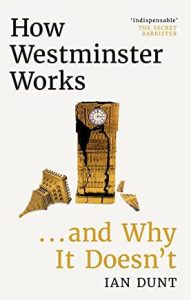As if a downpour on the long holiday weekend (and Coronation Day) were not enough to dampen the spirits, I just read Ian Dunt’s How Westminster Works … and Why It Doesn’t. It’s an excellent book, forensic in its analysis of the operations of the UK’s central government – and that is exactly why it’s so deeply depressing and angry-making. The chapters cover both the political processes – selection of MPs, role of special advisers, the imbalance of power between the Executive and Parliament, lobby journalism – and the official aspects – an amateur-by-design civil service that’s becoming ever-less capable, increasing tensions between ministers and officials, the dire impact of the Treasury. The book is even handed, pointing out that many of the trends that make for ineffective government today started in the 1990s or before, and were accelerated significantly by New Labour, before being turbo-charged by the succession of Conservative governments that have followed.
My takeaways are:
- It would actually be a bad idea to reform the House of Lords as it’s the only part that semi-functions
- None of the actors in UK national politics have any incentive to change anything – for instance, proportional representation would be excellent but neither Tories nor Labour want it
- I already thought more devolution to sub-national levels is desirable, and now think it’s the only hope of introducing any competence into UK government (although many people in Whitehall and Westminster have the cheek to talk about a lack of capacity at local level).
If you really want to get angry about the pervasive incompetence of the government, just read the chapter on Afghanistan. Shameful.
The book ought to go on every reading list for UK politics and government courses, and be read by all interested citizens. Buy it and despair. It complements Paul Johnson‘s excellent and equally angry-making Follow The Money, and my colleague Dennis Grube‘s more equable but still damning Why Governments Get It Wrong and How They Can Get It Right. Perhaps the most depressing thing in the UK is that when Donald Trump started destroying the US government’s efficacy (documented in Michael Lewis’s The Fifth Risk) he intended to do so. Our politicians and officials are destructive by accident. Destroying democracy through incompetence is somehow even more dispriting than doing so through malevolence.
What makes this even more depressing is that the need for effective government is increasing – collective action challenges like climate change, new security concerns, technological transformations all point to an increased need for a strategic economic policy framework. This isn’t going to happen if all the politicians’ and officials’ focus is on strategising for the next minuscule political advantage on social media.
The book does end with some suggestions for reform, but I found this chapter a bit half hearted. It isn’t that they wouldn’t be good ideas, just that it’s hard to see any incentive or ability to implement them. At least today (6 May 2023) we showed the UK can still put on a grand ceremony, even in a downpour.
